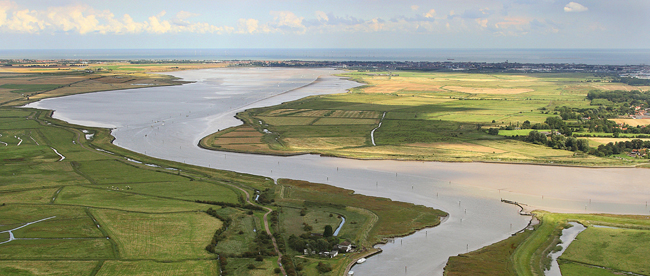Climate change
The story of the Broads National Park is inherently linked to our changing climate. The easterly, low-lying and coastal nature of the Broads landscape makes it particularly vulnerable to the predicted impacts of climate change and sea level rise, including coastal and river flooding.

At the same time, our wetland landscape has been steadily sequestering carbon since the end of the last ice age, and now stores some 44,000,000 tonnes of CO2. In context, that is close to the amount of CO2 produced by the generation of electricity in the UK in 2020.
We need to plan now for the changes ahead, such as wetter winters, drier and hotter summers, and more frequent extreme events like storms and heavy rainfall, to lessen negative impacts and make the best use of positive opportunities.
If you are looking for ways to reduce your own carbon footprint, we recommend you visit the “Low Impact Living” guide produced by the Suffolk Creating the Greenest County initiative. This can be found at: https://www.greensuffolk.org/low-impact-living/
Climate Mitigation
We are committed to making the Broads National Park into a Zero Carbon area. To understand our starting point, we worked with the other UK National Parks to commission a baseline survey from Lancaster University based Small World Consulting Ltd, to estimate the carbon footprint of the Broads. The full report can be read online.
This showed that the footprint of the Broads could be broken down into the following areas;
- Energy Only GHG - 123,414 tonnes of CO2e
- Food & Drink – 107,807 tonnes CO2e
- Travel to and from the Broads – 102,317 tonnes CO2e
- Land use – 145,236 tonnes CO2e
- Other – 38,603 tonnes CO2e
Some of these footprints will require national change – for instance, the energy footprint of the Broads will reduce as the national electricity grid moves towards a zero carbon basis.
We will therefore focus our efforts on the local changes that need to be made, by enabling the transition to zero carbon boating, and ensuring that visitors travel to and from the park via sustainable transport. We are also working with farmers and the government to develop low carbon farming practices, including wetland farming to reduce emissions from peat in the broads.
Race to Zero commitment
The Broads Authority is committed to reducing its share of Greenhouse Gas Emissions and is taking part in the ‘Race to Zero’, alongside other UK National Parks. This is the United Nations-backed initiative to halve global emissions by 2030 and reach net zero by 2050.
The Authority’s work towards achieving net zero spans its entire operations, from decarbonising its work programme, partnership projects with farmers, landowners, local and district councils, through to working with the tourism industry and the wider public to reduce carbon emissions.
In 2019, in recognition of the climate emergency, the Authority pledged to make its own operations carbon neutral by 2030, and to aim for a zero-emissions by 2040, which means reducing its carbon emissions by half by the year 2030. By 2022, it had achieved a reduction in its carbon footprint of 21%.
The overall footprint of the Broads National Park, including the visitors, residents, industry and agriculture was analysed by Small World Consulting. Their analysis suggest that hitting Net-Zero will be more challenging for the Broads than other UK National Parks because of the limited potential of the landscape to sequester (draw down) Greenhouse Gases from the atmosphere.
The data shows that if the Broads National Park cuts GHG emissions at a “Paris Aligned” rate, we will reach net zero later than the other National Parks - after 2050. This is due to the residual emissions that will remain economy wide after 2050, and the limited capacity for the Broads to increase the rate at which its landscape absorbs CO2 from the atmosphere. This does not mean that the Broads has been set a less strenuous target than the rest of the National Parks Family.
We will review the latest science and best practice to ensure we maximise our efforts to reach net zero by 2050, whilst protecting the special qualities of the Broads’ natural and cultural heritage.
Visit our what we are doing page to find out more.
Broadland Futures Initiative
To support the communities in the Broads to adapt to the risks posed by climate change, in particular flooding risk driven by rising sea levels, the Broadland Futures Initiative.
For more information, please visit our Broadland Futures Initiative page.

